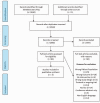ESO Guideline on covert cerebral small vessel disease
- PMID: 34414301
- PMCID: PMC8370079
- DOI: 10.1177/23969873211012132
ESO Guideline on covert cerebral small vessel disease
Abstract
'Covert' cerebral small vessel disease (ccSVD) is common on neuroimaging in persons without overt neurological manifestations, and increases the risk of future stroke, cognitive impairment, dependency, and death. These European Stroke Organisation (ESO) guidelines provide evidence-based recommendations to assist with clinical decisions about management of ccSVD, specifically white matter hyperintensities and lacunes, to prevent adverse clinical outcomes. The guidelines were developed according to ESO standard operating procedures and Grading of Recommendations, Assessment, Development, and Evaluation (GRADE) methodology. We prioritised the clinical outcomes of stroke, cognitive decline or dementia, dependency, death, mobility and mood disorders, and interventions of blood pressure lowering, antiplatelet drugs, lipid lowering, lifestyle modifications, glucose lowering and conventional treatments for dementia. We systematically reviewed the literature, assessed the evidence, formulated evidence-based recommendations where feasible, and expert consensus statements. We found little direct evidence, mostly of low quality. We recommend patients with ccSVD and hypertension to have their blood pressure well controlled; lower blood pressure targets may reduce ccSVD progression. We do not recommend antiplatelet drugs such as aspirin in ccSVD. We found little evidence on lipid lowering in ccSVD. Smoking cessation is a health priority. We recommend regular exercise which may benefit cognition, and a healthy diet, good sleep habits, avoiding obesity and stress for general health reasons. In ccSVD, we found no evidence for glucose control in the absence of diabetes or for conventional Alzheimer dementia treatments. Randomised controlled trials with clinical endpoints are a priority for ccSVD.
Keywords: White matter hyperintensities; cerebral small vessel disease; covert; dementia; lacunes; leukoaraiosis; outcome; prevention; recommendations; silent brain infarcts; stroke.
© European Stroke Organisation 2021.
Figures








References
-
- Pasi M, Cordonnier C.Clinical relevance of cerebral small vessel diseases. Stroke 2020; 51: 47–53. - PubMed
-
- Smith EE, Saposnik G, Biessels GJ, et al.. Prevention of stroke in patients with silent cerebrovascular disease: a scientific statement for healthcare professionals from the American Heart Association/American Stroke Association. Stroke 2017; 48: e44–e71. DOI: 10.1161/STR.0000000000000116. - PubMed
Grants and funding
LinkOut - more resources
Full Text Sources

